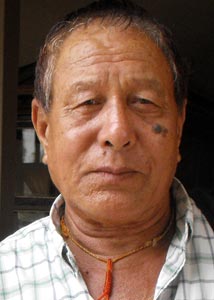Name: Kalsang Thakhay
(Alias: No)
Gender: Male
Interview Age: 75
Date of Birth: 1935
Birthplace: Bhendho Chingkhor, Amdo, Tibet
Year Left Tibet: 1959
Profession: Monk
Monk/Nun: Previously
Political Prisoner: No

Interview No.: 63M
Date: 2010-04-08
Language: Tibetan
Location: Doeguling Settlement, Mundgod, Karnataka, India
Categories: Resistance and Revolution
Keywords: Amdo, childhood memories, Chinese -- first appearance of, Chinese army -- invasion by , Chushi Gangdrug guerrillas, Dalai Lama, monastic life, refugee in India -- life as, resistance fighters
Summary:
Kalsang Thakhay was born in a village near Rikong in Amdo Province. His parents eloped to China because their parents opposed their marriage and he was left with his grandparents at the age of 3. Before age 4 he was sent to the local monastery as a monk where he lived until age 12 when he and another monk ran away to go to Lhasa. They spent a year en route in Kongpo constructing roads for the Chinese.
Kalsang Thakhay recalls his good fortune of receiving blessings from His Holiness the Dalai Lama on his journey to China in 1954. Kalsang Thakhay joined Gaden Monastery near Lhasa and worked in a monastery store and as a teacher. In March of 1959 monks were requested guard the Potala Palace. Kalsang Thakhay volunteered and describes how the monks received weapons from the Tibetan Government and were barely trained by soldiers. They were told to go back and guard their monasteries, but Lhasa was bombed that day. The monks were then ordered to join the Chushi Gangdrug guerrillas.
Kalsang Thakhay recounts an incident where the Chinese shot at the Tibetans from an airplane and the guerrillas shot back. He witnessed the final moments of the resistance movement when some wanted to stay and fight and others felt it was useless and wanted to flee. Kalsang Thakhay later joined the Indian army with the hope to return to Tibet and fight against Chinese soldiers.
Interview Team:
- Rebecca Novick (Interviewer)
- Ronny Novick (Videographer)
- Namgyal Tsering (Interpreter)

